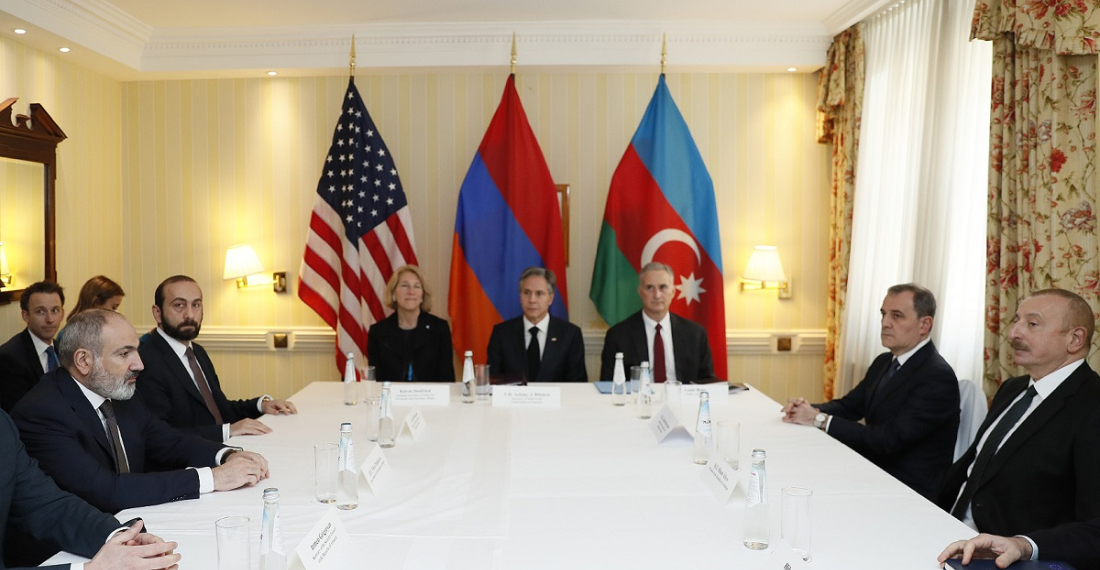For the last weeks Armenia-Azerbaijan negotiations on a peaceful normalisation of relations appeared stalled. The stand-off with Azerbaijani activists on the Lachin Corridor continues to hinder progress. The US initiative to organize a Pashinyan – Aliyev meeting at the Munich Security Conference earlier this month was "a step in the right direction", writes Benyamin Poghosyan in this op-ed for commonspace.eu. "It gave a new breath of life to the negotiation process, and efforts are underway to revive the Brussels format and organize the fifth Pashinyan – Aliyev meeting in Brussels with the participation of the President of the European Council, Charles Michel."
After the brief momentum in Armenia – Azerbaijan negotiations in late September - early October 2022, the peace process seemed to stall. Assessing what went wrong after the 6 October 2022 Prague meeting is challenging. However, the Sochi summit held on 31 October and the meeting between foreign ministers held in Washington on 7 November did not add optimism to the future of the negotiation process.
Azerbaijan's decision to close the Lachin Corridor, the only route connecting the self-described Nagorno Karabakh Republic with Armenia, and its obsession with the personality of Ruben Vardanyan, a new state minister of Nagorno Karabakh, did not contribute to the creation of a conducive environment for negotiations. The growing humanitarian crisis and the absence of formal negotiations have triggered fears of possible new escalations along the Armenia – Azerbaijan state border and/or in Nagorno Karabakh.
During this period, Armenia and Azerbaijan continued to work on the draft of the peace treaty, exchanging suggestions and ideas, and Yerevan sent its version of the final document to Azerbaijan and the OSCE Minsk Group co-chair states in mid-February. However, working on a peace treaty cannot replace negotiations.
Vardanyan's removal paved the way for the resumption of negotiations
In this context, the US initiative to organize a Pashinyan – Aliyev meeting at the Munich Security Conference was a step in the right direction. It gave a new breath of life to the negotiation process, and efforts are underway to revive the Brussels format and organize the fifth Pashinyan – Aliyev meeting in Brussels with the participation of the President of the European Council, Charles Michel. At the same time, on 23 February 2023, Ruben Vardanyan was removed from his position as Nagorno Karabakh state minister. According to the official explanation, this was done not to exhaust the resistance level of the state in all aspects. It is tempting to assume that the only reason behind this decision was Azerbaijan's pressure.
However, small communities have their internal and quite complicated dynamic of domestic politics, which may play quite a significant role in shaping and influencing the decision-making process. Nevertheless, regardless of the reasons behind this decision, it paved the way for the resumption of negotiations between the representatives of Azerbaijan and the self-described Nagorno Karabakh Republic. A new meeting of the sides took place on 24 February, and they agreed to resume the gas and electricity supply to Nagorno Karabakh from Armenia, which Azerbaijan cut.
Armenia and Azerbaijan at the ICJ
On 22 February 2023, the International Court of Justice (ICJ) decided on Armenia's and Azerbaijan's respective requests for additional provisional measures in their competing cases before the Court under the Convention on the Elimination of All Forms of Racial Discrimination. Armenia asked that the ICJ order Azerbaijan to unblock the Lachin Corridor and stop disrupting the supply of gas and other public utilities to Nagorno-Karabakh.
Azerbaijan, in turn, asked that the ICJ order Armenia to enable it to demine areas to which Azerbaijani citizens will return and stop planting landmines in Azerbaijani territory. By a near-unanimous vote (13 for, two against), the ICJ ordered Azerbaijan to urgently "take all measures at its disposal to ensure unimpeded movement of persons, vehicles, and cargo along the Lachin Corridor in both directions." The ICJ also unanimously rejected Azerbaijan's counter-request for provisional measures.
The decisions of the ICJ are mandatory, and all states must comply. The initial reactions from the Azerbaijani foreign ministry could have been more promising, as they sought to dilute somehow or misinterpret the decision. However, it is clear to everyone involved or dealing with the Nagorno Karabakh conflict that no successful negotiations are possible under blockade, as around 120,000 Armenians of Nagorno Karabakh face acute shortages of food and medicine.
Despite rejecting the mere fact of the blockade, Azerbaijan articulated two primary demands to end it – the removal of Ruben Vardanyan and the establishment of an Azerbaijani checkpoint on the Lachin Corridor. Ruben Vardanyan has already left his position, while the change of modalities of the functioning of the Lachin Corridor is a non-starter for Armenia and Nagorno Karabakh.
The EU monitoring mission in Armenia definitely will contribute to the stabilization of the situation
Meanwhile, the EU monitors for the new, two–year term EU monitoring mission started to arrive in Armenia. The mission will have around 60 monitors and 40 technical staff. It will be headquartered in the Vayots Dzor region of Armenia, the epicenter of the September 2022 Azerbaijani aggression against Armenia. The monitoring mission definitely will contribute to the stabilization of the situation. However, it cannot act as a hard security deterrence against potential new Azerbaijani attacks.
The EU did not deploy the mission to freeze the conflict but to create a more conducive environment for successful peace negotiations. In the current situation, international actors involved in Armenia – Azerbaijan peace negotiations should increase their pressure on Azerbaijan to end the Lachin blockade, bringing the process back into a more positive realm.







